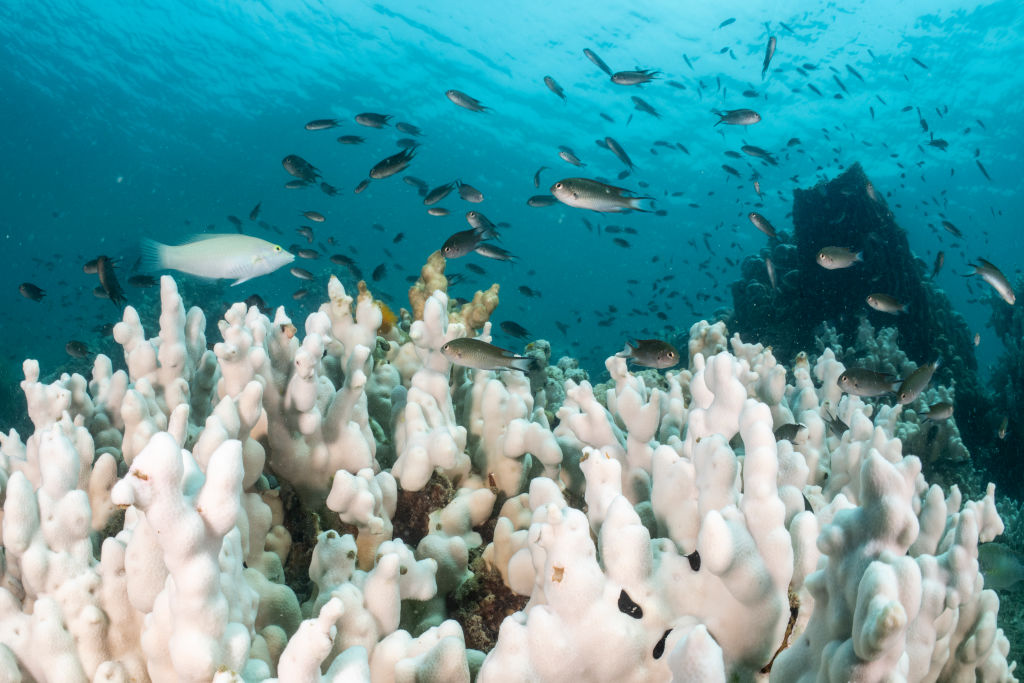The exact moment when Earth will reach its tipping points—moments at which human-induced climate change will trigger irreversible planetary changes—has long been a source of debate for scientists. But they might be closer than we think. A report published today says that the Earth has passed its first climate tipping point.
[time-brightcove not-tgx=”true”]
The second “Global Tipping Points” report published by the University of Exeter found that warm-water coral reefs are passing their tipping point. Rising ocean temperatures, acidification, overfishing, and pollution are combining to cause coral bleaching and mortality, meaning that a large number of coral reefs will be lost unless the global temperature returns towards 1°C warming or below.
“We’re in a new climate reality,” said Tim Lenton, founding director at the Global Systems Institute at the University of Exeter, who led the report. “We’ve crossed a tipping point in the climate system, and we’re now sure we’re going to carry on through 1.5°C of global warming above the prior industrial level, and that’s going to put us in the danger zone for crossing more climate tipping points.” The planet is predicted to cross the 1.5°C threshold within the next 5 years, according to a report from the World Meteorological Organization. Once that threshold is reached, the planet will see more frequent and intense extreme weather and strains on food production and water access—impacts many nations vulnerable to climate change are already seeing.
The authors define a tipping point as “occurring when changes in a system become self-perpetuating and difficult to reverse beyond a threshold, leading to substantial, widespread impacts.” Scientists have found as many as 25 major tipping points, including the Amazon rain forest transforming from a lush forest that stores carbon emissions to a dry savannah, and the permanent melting of polar sea ice whereby the dark open water absorbs more heat compared to white snow, encouraging further melting.
160 scientists in 23 countries compiled the latest data and literature on the topic, and found that, in the years since launching the report in 2023, reefs around the world have begun passing their thermal tipping point. “We’ve seen 80% of coral reefs experience unprecedented heat waves, bleaching events, and die back,” said Lenton. The widespread collapse of reef ecosystems would be devastating for marine and human life— reefs help support fisheries, and protect coastlines from storm surges and rising sea levels. Of all the tipping points, coral reefs have one of the lowest thresholds for rising temperatures—meaning it’s no surprise that it’s the first to be breached.
There are other measures of the environment’s health that scientists are also watching. A September report found that we’ve already passed seven of the nine “planetary boundaries” (including the ocean becoming more acidic and the transformation of natural landscapes)—these are thresholds that keep Earth’s systems hospitable to life and protect against breaching a tipping point.
Today’s report also found that the global temperature threshold required to trigger the widespread dieback of the Amazon rain forest is lower than previously thought, with the lower end of the estimated range now at 1.5°C. The authors emphasized the need for urgent action to avoid this fate, including targeted investments in conservation and restoration, to preserve the forest for the more than hundred million people who depend on it. They also warned that the Atlantic Meridional Overturning Circulation, a system of ocean currents that circulates water within the Atlantic Ocean, is at risk of collapse below an increase of 2°C of global warming above pre-industrial temperatures. If this happens, it would trigger harsher winters in north-west Europe, disrupt the West African and Indian monsoons, and decrease agricultural yields in much of the world.
A number of positive changes are being made around the world, of course, as green alternatives like electric vehicles and solar panels become more widely adopted—and affordable. “There is growing evidence of what we call ‘positive tipping points’ where the change to zero-emission technologies and behaviors is also becoming self propelling,” Lenton says.
But if we want to avoid crossing further climate tipping points there’s more progress to be made, he adds. “We know we need the solutions to accelerate if we’re going to limit warming to a level that could limit the risks from the bad tipping points and the climate.”

